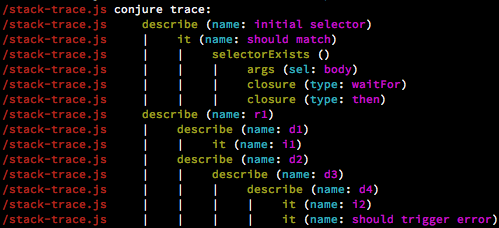Parallel CasperJS runner, BDD flow, module-based tests, API helpers
describe()/it()and hooksrequire('relative/path/in/my/proj/module.js)- Bootstrap test modules with common settings and arguments
- Full access to standard CasperJS APIs
- Helpers use preexisting jQuery for selectors
- Stack traces that cover
describe()/it()and helpers - Load test directories recursively, filter by
it()/filename regex
module.exports = function(conjure) {
conjure.set('initPath', '/login').set('initSel', '.login');
conjure.test('login page', function() {
this.describe('form', function() {
this.it('should not auto-check "Remember Me"' , function() {
this.conjure.selectorExists('.remember-me');
this.conjure.selectorMissing('.remember-me:checked');
});
});
});
};- Displayed after the standard
CasperJStrace. - Cover
describe()/it()and helpers.
After TypeError:
By default, traces are limited to logs from the most recent it().
After TypeError with --full-trace:
After a timeout:
Consecutive repeats are collapsed into a count (ex. x 34).
Basic run:
conjure --server /path/to/myproj/http-server
Start the server. Run all test scripts under
<cwd>/testthat end with.js. Kill the server.
utils: Native CasperJS module.colorizer: Native CasperjS module.casper: Native CasperJS module.conjure: Helpers described below.- Custom properties added to
thisin subsequently executed hooks andit()callbacks.
npm install conjure
npm test
MIT



